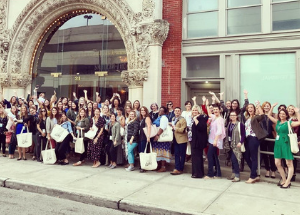As a recent college graduate, I'm in the thick of navigating the post-grad journey. While you learn a lot in college, there isn't much to prepare you for the massive identity switch between being a full-time student and a full-time young professional.
Perhaps the most significant difference in this time of change is the people I frequently interact with. A few months ago, I was working at an internship with peers my age (18-24). Now that I work in a professional setting, most of my colleagues are older and focused on their partners, buying homes, and taking care of children. This vastly different population got me thinking about marketing to different generations.
I was born in the mid-'90s, and consider myself a mix between a millennial and a member of Gen Z. I grew up playing outside (rather than with an iPad), but I can't remember a time without the internet. According to a recent study, Gen Z makes up 25% of the population. Additionally, by 2020, approximately 40% of all consumer markets will consist of Gen Z members. Growing up with the advancement of the internet and social media has shaped my generation in a way that will change the way brands market to us in the future.
Here's how social media has made an impact on Gen Z:
- Social media is a resource for information
Twitter, Facebook, Instagram, Snapchat, and Tumblr are vast sources of information. While these sites provide educational materials, they also offer information on topics our parents, teachers, mentors, and friends couldn't answer. While casually browsing social media sites, I have found helpful information regarding study tips, how to handle stressful situations, and experiences I will never live through.
- We get our news from Twitter
More often than not, we get our news from Twitter or another social media platform. By scrolling through our timelines, we see whatever current events are happening, how to help, and how to stay safe. For example, during mid-winter break my freshman year of college, I was driving around Kalamazoo with my best friend. Scrolling through Twitter, we learned about the news of an active shooter. Additionally, with people tweeting about their experiences and the shooter's location, we were able to navigate ourselves to safety.
- Make and cultivate relationships
Joining special interest groups on social media (such as fandoms) allows us to make new friends around the world. During the peak of my One Direction obsession, I frequently chatted with young people in Dubai, London, and Sydney. In addition to building long-distant online friendships, social media helps us make connections in real life as well.
To effectively market to a rising generation, understanding the trends that have shaped their online experience is essential. But, understanding their online habits and behaviors is equally as crucial.
Here are some notable trends on how Gen Z interacts with the internet and social platforms:
- Gen Z has a short attention span...
Members of Gen Z have a whopping 8-second attention span. Content needs to be engaging and eye-catching to hold our attention span. Short-form videos will be a key player in marketing to this generation. The success of apps such as Vine and TikTok have showcased this.
- ... but we can focus when we want
While our attention span is short, it doesn't mean that we can't focus when we want to. We are known for binging content if it catches our attention (hello, Netflix).
- Our world is filled with content
The internet has been around almost longer than we have been alive, so it is essential to recognize that we consume a great deal of content. We see content from advertisements, news, our friends/family, and current trends. Because of an oversaturated timeline, we have developed a very selective filter on what we want to see in our online space. And this filter applies to advertisements and brands.
- Facebook is out, Snapchat is in
Facebook is a platform of the past for Gen Z users. It is often viewed as a platform for older people. Since visual content is easier and faster to consume, we put our focus on YouTube, Snapchat, and Instagram.
- We want your product to mean something
Members of Gen Z have a low tolerance for advertisements with no meaning behind them. We are concerned about the world and want to make a difference when we can. This means we will go out of our way to buy products that will make a positive impact.
- The more relatable, the better
The kind of content that appeals to us most is #relatable. We've seen brands tweet professionally and seriously, so when a company tweets something funny or outrageous, we notice it more. We want to know that your company understands us and how we feel. So keep the tone casual while still communicating your message.



